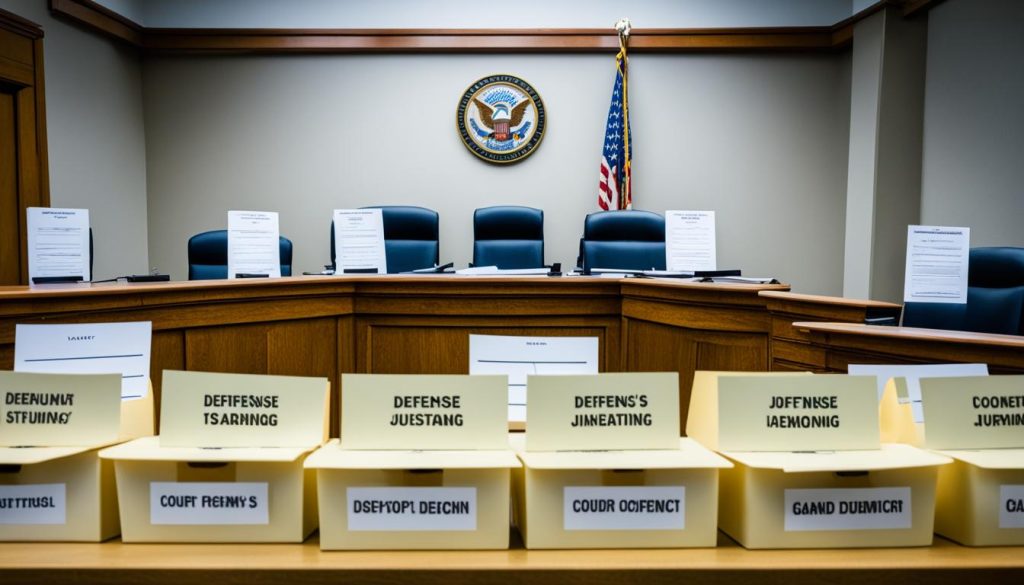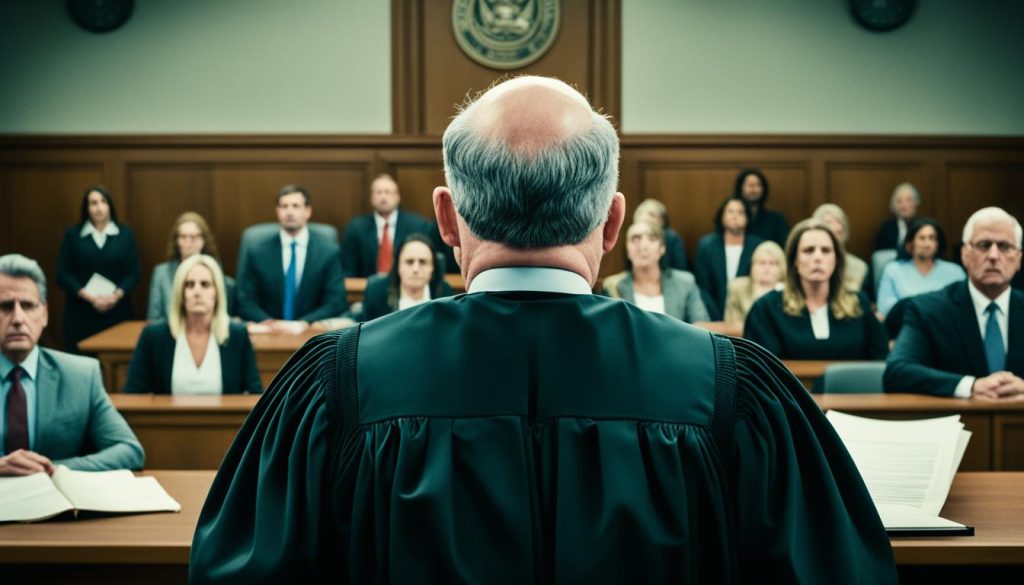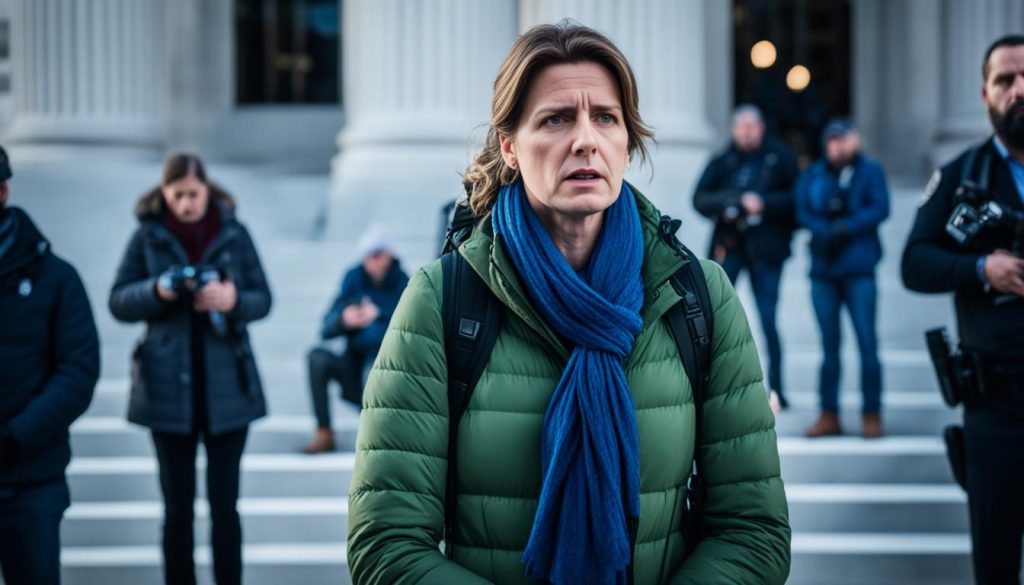Being charged with a crime can feel overwhelming and stressful. It’s important to know the legal steps and process to protect your rights. This guide will walk you through the key stages, from arrest to defense and appeals. Understanding the criminal justice system helps you make better decisions and boosts your chances of a good outcome when facing criminal charges.
Key Takeaways
- Understanding the criminal proceedings, from arraignment to appeal, is crucial when charged with a crime.
- The prosecutor plays a key role in the charging process, evaluating the strength of the case and deciding whether to file charges.
- Plea bargaining is a common practice, with over 90% of federal and state criminal cases not going to trial.
- Defendants have the right to appeal a felony conviction based on a mistake of law during the trial.
- Probation officers play a role in enforcing court-imposed conditions as part of a criminal sentence.
Understanding the Criminal Justice Process
The criminal justice process starts with a police arrest report. The prosecutor then looks at this report to decide on criminal charges. They might file charges directly or send the case to a grand jury for an indictment. Sometimes, a preliminary hearing happens to see if there’s enough evidence for a trial1.
How Police Officers and Prosecutors Initiate Cases
Agencies like the Environmental Protection Agency (EPA) and Fish and Wildlife Service (FWS) are key in investigating environmental crimes. They work with the U.S. Coast Guard (USCG), Department of Labor (DOL), and others in the federal system1.
After an indictment, a defendant might see a judge for a first hearing. They could be released on bond if they meet certain conditions1. Pre-trial motions are also filed to address issues before the trial starts1.
In trials, jurors are picked randomly from local voter records1. Opening statements let both sides tell their side of the story without using evidence yet1.
The process varies a lot across places. In Michigan, prosecutors check if they can prove the charges before making a decision2. The time from crime to arrest can also change a lot, based on where the defendant is2.
In Michigan, bond conditions can be very different, from no money needed to needing to pay a lot2. There might be extra rules, like no drinking or staying away from the victim2. The court sets a preliminary examination within two weeks of the first court meeting, sometimes moving it to a later date2.
Michigan defendants can choose to skip the preliminary examination, leading to most felony cases going to Circuit Court2. The court deals with different pleas, like guilty or not guilty2.
Pretrial Conferences in Michigan aim to settle cases without a trial, often through plea deals2. Pretrial Proceedings also cover important issues like confessions and searches, which are discussed in court through motions2.
The Arrest and Charging Process
If you’re charged with a crime, knowing the arrest and charging process is key. After an arrest, the police tell you the crime they think you committed3. Then, prosecutors decide the final criminal charges, which might be different from what the arrest report said3.
At your first court hearing, called an arraignment, you learn the official charges against you. You also get to say how you plead3.
Over 90% of criminal cases settle with a plea bargain before going to trial, with federal cases often reaching 97%4. But, the process before trial and during trial must follow the law. This lets the defense challenge evidence and share good evidence with the prosecution4.
If your case goes to trial, you get a preliminary hearing to look at the evidence before it goes to the circuit court3. This hearing helps stop police from making mistakes and ensures there’s enough evidence. If the evidence is weak, the charges might be dropped3.
The criminal proceedings can be complex. It’s important to get advice from a skilled lawyer to protect your rights and get a fair result5. The District Court handles most cases, including some felonies like theft and forgery5. If you face certain charges, you can choose to move your case to the Circuit Court for a jury trial if the possible jail time is over ninety days5.
Preliminary Hearings and Grand Juries
If you’ve been charged with a crime, you’ll go through important steps like preliminary hearings and grand juries. These steps help decide if your criminal charges will lead to a full trial.
The Role of Preliminary Hearings
Preliminary hearings are a key step in the criminal charges process. Here, the prosecutor shows evidence to a judge to prove there’s enough reason to keep the case going6. They must show it’s more likely than not that a crime was committed and who did it6. Even though the Commonwealth can use some hearsay, recent decisions have limited its use. The Pennsylvania Supreme Court made it clear that live testimony is needed6.
How Grand Juries Operate
For felonies, prosecutors might take evidence to a grand jury to see if they get an indictment6. These juries have about 16-23 members, and at least twelve must agree for an indictment7. The federal government must use grand juries for all felonies, but states don’t have to7.
Grand juries work in secret, and defendants or their lawyers don’t have to be there7. In the U.S., 23 states use grand juries for legal cases8. These juries look at five to seven cases a day, lasting weeks or months8. The experience of grand jurors can affect which cases get indicted8.
Dealing with preliminary hearings and grand juries can be tough. But knowing how they work is key for those facing criminal charges.

charged with a crime, legal steps, criminal charges
Being charged with a crime is a tough and stressful experience. Knowing about criminal proceedings and legal steps can protect your rights. From the start, like being arrested and charged, to plea bargaining and trial, it’s key to understand the criminal justice system.
Prosecutors and grand juries play a big role. For felonies, they might use grand juries to decide if charges are right9. Grand juries have 16 to 23 members, more than petit juries9. They don’t need everyone to agree to indict, unlike petit juries that must all agree to convict9.
Prosecutors might send target letters to suspects, asking them to talk to the grand jury9. Grand juries work in secret, and their decision can lead to an indictment or no charges9. If you can get transcripts, it depends on your state’s laws9.
Knowing about criminal proceedings timelines is important. Trials usually start within six months of saying not guilty10. The prosecution doesn’t get to see the defense’s evidence, but they can in some places10. Also, felonies must be filed within three years, and misdemeanors within one to 18 months, but this can change by place10.
These are some key things to remember when facing criminal charges. Getting to know the criminal justice process is vital for dealing with the challenges and keeping your rights safe.

Preparing Your Defense
Hiring an Attorney
If you’ve been charged with a crime, it’s crucial to get an experienced criminal defense attorney. They will explain your rights and help you pick the best legal defense strategy. They’ll also represent you in criminal proceedings11. An attorney can talk to prosecutors, speak for you in court, and look into plea bargaining or appeals if needed11.
When facing criminal charges, having a skilled lawyer is key11. Federal criminal defense lawyers specialize in these cases and make sure you get the right legal help11. Even though you can defend yourself, it’s smart to get legal advice for a strong defense and to understand federal criminal law11.
The result of a federal criminal case can greatly affect your life. So, working closely with your attorney to plan a good defense is vital11. Your lawyer will help you find the best way to resolve the case, whether through a plea bargain or a trial11.
| Steps in the Federal Criminal Justice Process | Description |
|---|---|
| Investigation | Law enforcement gathers evidence and conducts interviews to build a case. |
| Charging | Prosecutors review the evidence and decide whether to bring formal charges. |
| Preliminary Hearing | A court hearing to determine if there is sufficient evidence to proceed with the case. |
| Discovery | Both the prosecution and defense exchange information and evidence. |
| Plea Bargaining | Negotiations between the defense and prosecution to resolve the case. |
| Trial | If a plea bargain is not reached, the case goes to a jury or bench trial. |
| Sentencing | If convicted, the defendant is sentenced according to federal guidelines. |
| Appeal | The defendant may appeal the conviction or sentence to a higher court. |
Going through the federal criminal justice system is tough, but with a skilled criminal defense attorney, you can build a strong legal defense. This can help you aim for the best outcome for your case11.
Conclusion
Being charged with a criminal charge can feel overwhelming. But, by understanding the criminal proceedings and taking the right legal steps, you can protect your rights. This can also help you get a better result12.
Most criminal cases end with a plea bargain from the prosecution. Bail can be set right after booking or at a later hearing12.
In the criminal justice process, you have the right to a jury trial in most cases. The prosecution must prove your guilt beyond doubt12. If the jury can’t agree, the judge might declare a mistrial. During sentencing, the court looks at the crime’s severity and your past crimes12.
If you’re charged with a crime, getting help from a skilled criminal defense lawyer is key. They make sure your case is handled right and your rights are protected. With the right lawyer and knowledge of the system, you can get through this tough time better121314.
FAQ
What is the typical process when facing criminal charges?
The criminal justice process starts with a police arrest report. The prosecutor then reviews it to decide on charges. They might file a complaint or send the case to a grand jury.
What happens at the initial court appearance?
At the first court appearance, also called an arraignment, the defendant learns the formal charges. They are told about the allegations against them and can enter a plea.
What is the role of preliminary hearings and grand juries?
Preliminary hearings let the prosecutor show a judge the evidence. This is to prove there’s enough cause for a trial. For felonies, evidence might go to a grand jury. They decide if there’s enough evidence for an indictment.
Why is it important to understand the criminal justice process?
Knowing the legal steps and the criminal justice system protects your rights. It covers everything from arrest to trial, including plea bargaining. It’s key to understand each stage to ensure your case is handled right.
What is the importance of hiring a criminal defense attorney?
Getting a skilled criminal defense attorney is crucial when facing charges. They explain your rights, suggest the best legal approach, and represent you in court.
Source Links
- Criminal Justice Process
- Steps in a Criminal Case, Emmet County Michigan
- The Process Of A Criminal Case In Maryland – JC Law
- How Are Criminal Charges Filed? – FindLaw
- The Criminal Justice Process | Queen Anne’s County State’s Attorney
- What is a preliminary hearing, and what happens afterwards?</p><p>| Goldstein Mehta LLC
- Charging
- Grand Jury / Preliminary Hearing
- Criminal Charges: How Cases Get Started
- TheLegal Process in the United States: A Criminal Case
- What To Do First When Faced With a Federal Criminal Charge | Perlman Defense Federal Criminal Lawyers
- Stages of a Criminal Case & The Legal Process
- What are… The Steps in a Criminal Case
- Steps of The Criminal Justice System | Floyd County, IA

